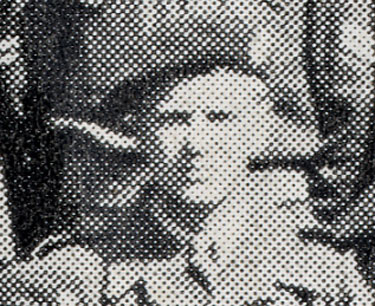VI COMMANDO
Lt-Col. Anthony David Lewis DSO MBE (OC) CdG
Lt. Anthony David “Tony” Lewis, formerly of the 2nd Battalion of the Dorset Regiment (having served in the British Expeditionary Force during the retreat from the Somme through to Cherbourg) and No.4 Commando (under Lt-Col. Percy Legard at Weymouth and taking part in the Lofoten Islands Raid in March 1941 – defending the Svolvaer Penninsula from counter-attack), served with No.5 Troop of No.6 Commando from 22nd January 1943 during the North African campaign.
Educated at St. Edward’s School (
He had been a Captain in the
He was further disappointed to find that he was returned as an Adjutant to a Territorial Battalion defending British beaches and which was converting to become a light Anti-aircraft (Ack-Ack) unit. This unit eventually shipped out as part of Operation Torch to the area around Bône in
In late 1942 he requested to be transferred back to the Commandos, being very disheartened with his life as a Gunnery Officer. His Commanding Officer agreed and the pair commandeered a motorbike for the journey to the area of the Commandos. Along the way they were straffed by a German aircraft, with the C.O. jumping off the moving bike whilst Capt. Lewis had to turn the bike around to pick him up again. He was interviewed and accepted a sub-altern position in charge of one of the Troop Sections of No.5 Troop of No.6 Commando at Sedjenane. The Commando was then moved to the Goubellat Plains.
Lt. Lewis was promoted to Troop Captain and Adjutant by Lt-Col. Derek Mills-Roberts on 10th March 1943 (to be effective from 26th February 1943) and served in this role until the return of Capt. R.D. Knox to the Commando on 8th June 1943.
Capt. Tony Lewis was made Troop Commander of No.5 Troop in the re-organisation of 21st June 1943, and was later promoted to Temporary-Major and made 2-i/c of No.6 Commando.
Following the move of Lt-Col. Mills-Roberts to Brigade HQ as Acting-Brigadier on 12th June 1944, T/Maj. Lewis was field-promoted to Acting/Lt-Colonel and CO of No.6 Commando – this was formalised on 24th June 1944. It is noted that Field-Marshall Montgomery referred to him as ‘the Boy-General’.
Promoted in the field from Temporary-Major to Acting-Lt/Col on 12th june 1944 he was later awarded the Croix De Guerre with Palm. The citation reads:
‘This officer assumed command of his unit when his Commanding Officer was called upon to take over command of the Brigade, the Brigade Commander having been wounded. The take-over was made at a critical stage of a heavy and prolonged enemy counter-attack, and the successful repulsion of the enemy in 6 Commando’s section with heavy loss to the enemy was largely due to the courageous leadership and exemplary conduct of LieutCol. Lewis under heavy and accurate harrassing fire.
He continued in command of 6 Commando very ably and throughout the campaign displayed the greatest gallantry and devotion to duty.’
In May 1945, Lt-Col. A.D. Lewis was awarded the DSO for his part in the OPERATION PLUNDER river assault to capture the ancient town of
‘Speed was the vital factor in this operation, as it was necessary to enter the city as soon as possible after the bombing. This was achieved largely by the skill and daring of Lt-Col. Lewis who led his men with such dash that three separate platoon localities were quicklyoverrun on his way to the city. His entry into the city itself in spite of considerable opposition from small arms and Panzerfausts was effected so quickly that the remainder of the Brigade was enabled to consolidate before the enemy became aware of the situation. Lt-Col. Lewis was at all times at the head of his troops, and his trust and courage contributed largely to the success of the whole operation.’
In the 1960’s the Ministry of Defence proposed Col. Lewis, along with two other candidates, to the Sultan of Oman to take-over control of the Sultan’s Army. Col. Lewis was interviewed by the Sultan in the Dorchester Hotel in
